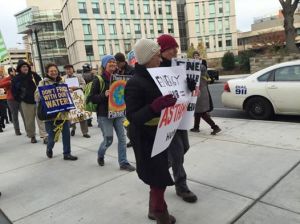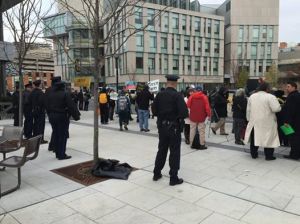
A group of protestors gathered in front of the Creese Student Center at 9 a.m. Dec. 5 to object to the conference event “Philadelphia: The Next Great Energy Hub,” hosted in part by Drexel University.
The Greater Philadelphia Chamber of Commerce’s CEO Council for Growth, “comprised of executives from the region’s biggest corporations in the energy, chemical, and infrastructure sectors” staffs and supports the Greater Philadelphia’s Energy Action Team, which hosted the protested conference. Companies which were involved in the committee to host the conference included Braskem America, the Dow Chemical Co., Exelon Corp., Monroe Energy, Philadelphia Energy Solutions, the Public Service Electric and Gas Co., Sunoco Logistics, UGI Corp. and many others.
The conference invited natural gas investors, as well as leaders in chemical and financial groups involved with natural gas energy resources, to hear speakers about the expansion of natural gas production and usage in greater Philadelphia. The speakers for the panel discussion on the usage of the Marcellus formation were Jason Bordoff, founding director of the Center on Global Energy Policy at Columbia University, George Stark, director of external affairs at Cabot Oil & Gas, and John Walsh, president and CEO of UGI Corp.
The Facebook group organizing the Drexel student protestors states that the conference promotes activities which would “exacerbate groundwater pollution already being seen in Pennsylvania as a result of hydrofracking for natural gas … increase air pollution in our neighborhoods from refineries and petrochemical factories … [and] increase greenhouse gas emissions and further exacerbate global climate change.”
The group organized to demonstrate that Drexel students are against these practices. Another statement of the protesting students said, “With all of Philadelphia’s leaps in sustainability and Drexel’s supposed commitment to the environment, this plan represents a giant step backwards. We can only stop this destructive vision with immediate and deliberate action.” Protesting groups of Drexel included the Sierra Student Coalition, the Fossil Fuel Divestment Group, the Naturalists Association and others.
The protest included more than just Drexel students, as members and involved citizens from 19 Philadelphia and national environmental and sustainable energy groups were in attendance. Following the protest there was a counter-conference held concurrently with the disputed conference to “discuss what a sustainable Philadelphia could and should look like,” according to the protestors. At the anti-conference, speakers Kevin Pool of the Grays Ferry Neighbors Association, Poune Saberi from Physicians for Social Responsibility, John Scorsone of SolareAmerica and Drexel student activist Matthew Wang provided information on Philadelphia and sustainable energy as well as information on natural gas.
As Pennsylvania has established its dominance as the leading natural gas producing state in the United States, this conference falls in the middle of a very controversial period of policy creation and federal involvement in energy commerce. The biggest reason for this controversy is the disagreement evolving between environmentalists and economists concerning the pros and cons of natural gas production and usage. According to the Council for Growth, “the current daily gross production of natural gas from the Marcellus [shale formation] is in excess of 15 billion cubic feet — and at that level of production the formation has well over a 100-year reserve life.” This huge reserve of natural gas is enticing for economists and politicians, especially in this tense period between the U.S. and the countries which provide oil imports the U.S. has relied on for the past several decades. However, environmentalists are concerned about potential pollution-causing effects of natural gas drilling and usage.

The ongoing disputes between the two camps on natural gas usage have yet to be affected significantly by state and federal legislation. Currently, the Pennsylvania government offers grants for alternative fuel development and deployment programs as well as projects supporting the creation and research of natural gas vehicles. The Environmental Protection Agency made its last regulatory decisions on natural gas and oil in April 2012. The latest federal legislation to govern the industry demanded certain standards on natural gas and oil containment tanks and was updated August 2013. Right now, the fighting between camps is definitely mobile only on the civilian and corporate levels, and not within legislatures.
A final comment from the protest organizers stated that “we [the protestors] believe that with Drexel’s advertised support of green technologies and sustainability, the University should not be hosting events and providing support for the expansion of the fossil fuel industry. Philadelphia itself claims to be a leader in sustainability as far as cities go, and we believe that turning the city into a natural gas hub would be a major step backwards.” The protestors decidedly demonstrated an organized front against the conference to support this claim.

